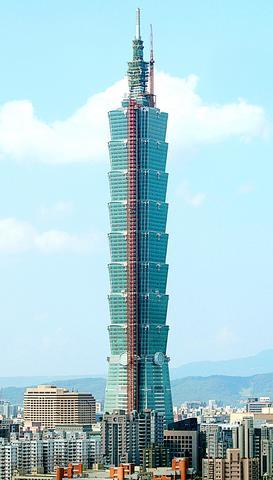The Taipei 101 office building laid claim to the title of the world's tallest skyscraper following a ceremony yesterday to position a 60m spire on top of the structure.
With the addition of the spire, the building boasts of a full height of 508m, eclipsing Malaysia's Petronas Twin Towers, a company executive said yesterday.
"We believe that Taipei 101 will bring a fresh taste to Taipei's skyline," said Lin Hong-ming (

PHOTO: REUTERS
Lin hopes the landmark, though still under construction, will attract more tenants in the Hsinyi district.
Though the leasing of office space is still in its initial stages, Lin expects about 80 percent of the 60,000 ping at Taipei 101 will be leased within 18 months.
"What concerns our potential tenants is how to earn more money after moving into Taipei 101 [with around-the-clock services] rather than saving money through lower rentals," Lin said.
Jones Lang LaSalle Taiwan, the primary leasing agent for the Taipei 101 tower, is not sure about the leasing prospects, however.
"We're seeking the right price and right tenants, who will have long-term occupancies. We're not in a rush," Matthew Shaw, director of Jones Lang LaSalle Taiwan, told the Taipei Times.
Property-market watchers said that slow corporate spending, a lukewarm office market, an increasing supply of office space and high rental rates charged by the Taipei Financial Center could dash the company's hopes.
"Eighty-percent occupancy is an aggressive target. I doubt many potential tenants are available now as big international companies such as Hewlett-Packard Co and IBM Corp just signed new lease contracts for new offices in the area," said Derek Huang (
Though Taiwan's economy is showing signs of recovery, the resilience has not extended to the office market, Huang added.
Carol Su (
For the moment, corporate CEOs are unlikely to rent luxury offices, Su said.
Another factor that could slow Taipei 101's leasing progress is the impact of the Sept. 11, 2001, attack on the twin towers in New York. Su said the attacks appear to have dampened multinational corporations' interest in skyscrapers.
A growing supply of office space in the Neihu and Nankang districts also put the leasing plan in trouble as those offices are attractive to companies looking for lower rental rates, Huang said.
Rents are about NT$1,100 per ping per month and NT$600 per ping per month in the Neihu and Nankang areas, respectively, according to Huang.
The rents will range from NT$3,000 to NT$4,000 per ping for tenants of Taipei 101, an official at the Taiwan Stock Exchange, one of the skyscraper's major shareholders and future tenants, said last month.

WAITING GAME: The US has so far only offered a ‘best rate tariff,’ which officials assume is about 15 percent, the same as Japan, a person familiar with the matter said Taiwan and the US have completed “technical consultations” regarding tariffs and a finalized rate is expected to be released soon, Executive Yuan spokeswoman Michelle Lee (李慧芝) told a news conference yesterday, as a 90-day pause on US President Donald Trump’s “reciprocal” tariffs is set to expire today. The two countries have reached a “certain degree of consensus” on issues such as tariffs, nontariff trade barriers, trade facilitation, supply chain resilience and economic security, Lee said. They also discussed opportunities for cooperation, investment and procurement, she said. A joint statement is still being negotiated and would be released once the US government has made

Authorities have detained three former Taiwan Semiconductor Manufacturing Co (TMSC, 台積電) employees on suspicion of compromising classified technology used in making 2-nanometer chips, the Taiwan High Prosecutors’ Office said yesterday. Prosecutors are holding a former TSMC engineer surnamed Chen (陳) and two recently sacked TSMC engineers, including one person surnamed Wu (吳) in detention with restricted communication, following an investigation launched on July 25, a statement said. The announcement came a day after Nikkei Asia reported on the technology theft in an exclusive story, saying TSMC had fired two workers for contravening data rules on advanced chipmaking technology. Two-nanometer wafers are the most

NEW GEAR: On top of the new Tien Kung IV air defense missiles, the military is expected to place orders for a new combat vehicle next year for delivery in 2028 Mass production of Tien Kung IV (Sky Bow IV) missiles is expected to start next year, with plans to order 122 pods, the Ministry of National Defense’s (MND) latest list of regulated military material showed. The document said that the armed forces would obtain 46 pods of the air defense missiles next year and 76 pods the year after that. The Tien Kung IV is designed to intercept cruise missiles and ballistic missiles to an altitude of 70km, compared with the 60km maximum altitude achieved by the Missile Segment Enhancement variant of PAC-3 systems. A defense source said yesterday that the number of

Taiwanese exports to the US are to be subject to a 20 percent tariff starting on Thursday next week, according to an executive order signed by US President Donald Trump yesterday. The 20 percent levy was the same as the tariffs imposed on Vietnam, Sri Lanka and Bangladesh by Trump. It was higher than the tariffs imposed on Japan, South Korea and the EU (15 percent), as well as those on the Philippines (19 percent). A Taiwan official with knowledge of the matter said it is a "phased" tariff rate, and negotiations would continue. "Once negotiations conclude, Taiwan will obtain a better